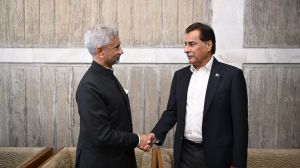Scaling the wall
One message from Beijing is loud and clear. China does not as yet supportIndia's claim to a permanent seat in the United Nations Security ...

One message from Beijing is loud and clear. China does not as yet supportIndia8217;s claim to a permanent seat in the United Nations Security Council. Itmay be reluctant to elevate another Asian power or merely hesitant aboutshowing its hand just yet. It cannot be that Beijing does not recognise, asseveral other major nations do, that India8217;s candidature is natural andlegitimate. So it was disappointing, to say the least, to find China8217;spresident Jiang Zemin rigidly silent when President K R Narayanan, on asix-day state visit to China, restated India8217;s case.
The Chinese agree the UN needs to be reformed, they agree developingcountries should be better represented in the councils of internationaldecision-making. But that is as far as it goes. By contrast, Germany8217;sforeign minister and France8217;s defence minister, keen to improve politicaland commercial relationships, were very forthcoming on their recent visitsto New Delhi. Both had no difficulty saying plainly their countries believeIndia should have a seat in the Security Council. Beijing is unable to makea similarly friendly gesture.
It is not that an undecided China is an insurmountable obstacle after all,the arguments strongly favour India. But it is a sad comment on therelationship between two countries who can be a positive force in the worldif they pull together and who will do themselves little good if they failto. If for no other reason than to manage the inevitable competition betweenthem in the economic sphere and for influence around the world, India andChina have to learn to cooperate and to build structures to nurture trustbetween them. That is not happening. Since the low point reached in May1998, relations have improved but not enough and the effort to move aheadlooks decidedly one-sided. Beijing has been pleased to receive such visitorsas President Narayanan this May and Foreign Minister Jaswant Singh lastJune. No high-ranking Chinese political leaders have been to India in thattime. Meanwhile India sounds like an eager beaver on resolving the borderdispute but China urges patience and improving the 8220;atmosphere8221; first.
How can Beijing8217;s buttoned-down, cautious friendliness be explained? Theanswer is it is getting mixed messages from New Delhi. The Vajpayeegovernment shows great consideration on some issues concerning China andless on others. In handling the Karmapa plea for asylum New Delhi avoidedbruising Chinese feelings and this week, as always when Indian and Chineseleaders meet, the official India position that Tibet is an autonomous regionof China was reiterated by President Narayanan. Reassuring as these are,there have been other somewhat different signals. The Chinese would have tobe blind not to notice new Indian initiatives in South East Asia which marka departure from past Indian policy. Among those initiatives are jointmilitary exercises with Vietnam, the eastern orientation being given to theIndian Navy and joint coast-guard operations with Japan and other nations inthe South China Sea. Nor will the new tenor of Indo-US relations haveescaped attention. Without a doubt there is scope for misunderstanding hereunless the two countries work harder at preventing that from happening.
- 01
- 02
- 03
- 04
- 05































